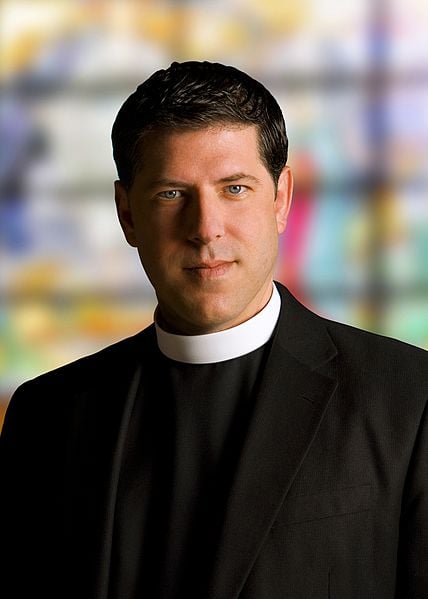I get the most interesting e-mails.
After posting the news about Thomas Williams yesterday, I got this e-mail from Fr. Albert Cutié:
Deacon:
I don’t think you should use the term “former priest” referring to someone who was ordained – who received the sacrament of Holy Orders. It makes it sound like you don’t believe in Sacramental Theology and that priesthood is reduced to a canonical function. I think we both know you cannot “un-priest” a priest or “un-deacon” a deacon.
Happy and blessed Advent!
In Christ,
Fr. Albert
An interesting point, I thought. I wrote back and suggested that perhaps “laicized priest” would be more accurate. He responded:
Even a laicized priest is still a priest. Canon Law does not dictate Sacramental Theology. I am surprised that this is your response.
We cannot discard people when it is convenient to the image of the institutional church. You cannot un-baptize and you cannot discard Holy Orders.
That is the point.
…My concern Deacon, is that the People of God don’t have much of a theological formation and when it comes to sacraments they are under the impression you can re-baptize, un-baptize, remove godparents, etc. etc. etc. They apply those same misconceptions to Holy Orders…
I would say “Fr. Thomas Williams marries” – why avoid the fact he is a priest forever? That is what our catholic tradition says he is…
I’m hardly an expert on this stuff, so I turned to some people who are.
I asked canon lawyer Ed Peters what he thought. He e-mailed me:
Canon law talks in terms of losing the clerical state. Of course, [Holy] Orders is indelible, but the clerical state is conferred/recognized by the Church, and Cutié has lost the clerical state.
“Former” or “ex-cleric” is perfectly accurate. So is “former priest,” in common parlance.
I got this response from Msgr. Steven Aguggia, judicial vicar with the Marriage Tribunal in the Diocese of Brooklyn:
The canonically precise term is “dispensed from all obligations arising from Sacred Orders.” He is correct in saying that because of the nature of the change a person is always a priest. His ontological relationship with God has permanently and essentially changed (like what happens in baptism); however, it does not mean that a person so dispensed is still a priest in good standing and can do what he wants. To say, “Fr. XYZ married” would be misleading and imply that nothing is different. Of course, that’s what he wants.
In common parlance, we say “laicized priest,” “former priest,” etc. and he is correct in saying that these are not canonically correct or precise terms.
Probably more correct would be “dispensed priest” or, perhaps better, a “priest dispensed from obligations of ordination.” This does not mean, though, that one can remain a priest and “enjoy” a priest’s life without the obligations (which seems to be what he is implying). That is because once one receives the dispensation from the Pope, one is not permitted to exercise priestly ministry and even some other ministries which “touch upon” priestly ministry (like teaching theology). The only exception to this is that such a person may hear a confession in danger of death.
UPDATE: A reader in Michigan writes:
The article struck home because I am of those former priests. To change a famous quote, you can take the man out of the priesthood, but you cannot take the priesthood out of the man.
My first job in a ministerial function after I left the active ministry was as the Director of Pastoral Care at [a hospital in] Kentucky. Our neighbor across the street from our rented house also worked at the hospital, and her first question to me was, “What do I call you?” Now, you also should know the good lady was Baptist. Not prepared for such a question, I fumbled a bit and said, “whatever you want.”
Whatever you want is my first answer to the question what do you call a former priest? My second answer is: call him by his name.
In terms of a description I see no need to muddy the waters by using a term (no matter how technically correct) that is foreign to the average Catholic. I am a laicized priest. I am a “former priest” in terms of what I do for a living.
Cutié makes one valid point: the laity in general are woefully ignorant of their faith in many respects. They are not lacking in devotion, but they are ignorant of many aspects of the Faith (like the sacraments) that they should know. That notwithstanding, the average Catholic knows perfectly well that Father-there no longer wears the Roman collar, no longer celebrates Mass, doesn’t do the things a priest does, and doesn’t get addressed as “Father.” The average Catholic also knows that in danger of death, the former priest can hear his/her confession just as validly as the regular parish priest. This way, no one gets deprived of the sacraments.
Cutié takes the Tu es sacerdos (You are a priest forever – Ps. 110:4) doctrine in the wrong direction. The important thing to remember is not that everything on the surface is supposed to stay the same so that every time someone sees me they say, “He is a priest, but he can’t function as a priest,” That would be like seeing me in my telescopic lenses and saying, “the poor guy is so handicapped he has to use those funky things to see.”
The important thing to know is that once a priest, always a priest in terms of who I am, the core of my being. I am here in extremis, if you need me.
Otherwise, I am just like every other Catholic who goes to Mass every Sunday, tries to keep his relationship with the Lord on the right track, and who will walk with you on this journey of Faith.












